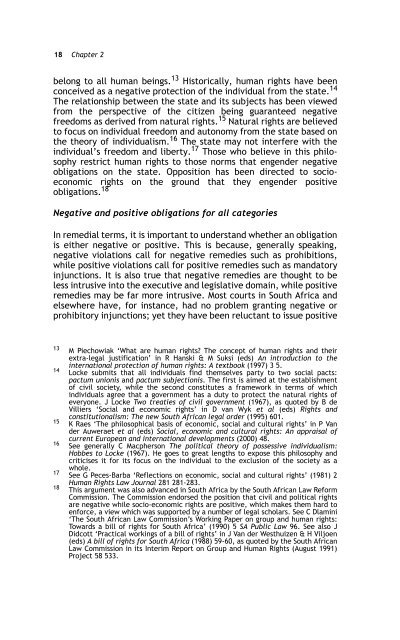LITIGATING SOCIO-ECONOMIC RIGHTS IN SOUTH AFRICA - PULP
LITIGATING SOCIO-ECONOMIC RIGHTS IN SOUTH AFRICA - PULP
LITIGATING SOCIO-ECONOMIC RIGHTS IN SOUTH AFRICA - PULP
Create successful ePaper yourself
Turn your PDF publications into a flip-book with our unique Google optimized e-Paper software.
18 Chapter 2<br />
belong to all human beings. 13 Historically, human rights have been<br />
conceived as a negative protection of the individual from the state. 14<br />
The relationship between the state and its subjects has been viewed<br />
from the perspective of the citizen being guaranteed negative<br />
freedoms as derived from natural rights. 15 Natural rights are believed<br />
to focus on individual freedom and autonomy from the state based on<br />
the theory of individualism. 16 The state may not interfere with the<br />
individual’s freedom and liberty. 17 Those who believe in this philosophy<br />
restrict human rights to those norms that engender negative<br />
obligations on the state. Opposition has been directed to socioeconomic<br />
rights on the ground that they engender positive<br />
obligations. 18<br />
Negative and positive obligations for all categories<br />
In remedial terms, it is important to understand whether an obligation<br />
is either negative or positive. This is because, generally speaking,<br />
negative violations call for negative remedies such as prohibitions,<br />
while positive violations call for positive remedies such as mandatory<br />
injunctions. It is also true that negative remedies are thought to be<br />
less intrusive into the executive and legislative domain, while positive<br />
remedies may be far more intrusive. Most courts in South Africa and<br />
elsewhere have, for instance, had no problem granting negative or<br />
prohibitory injunctions; yet they have been reluctant to issue positive<br />
13 M Piechowiak ‘What are human rights? The concept of human rights and their<br />
extra-legal justification’ in R Hanski & M Suksi (eds) An introduction to the<br />
international protection of human rights: A textbook (1997) 3 5.<br />
14 Locke submits that all individuals find themselves party to two social pacts:<br />
pactum unionis and pactum subjectionis. The first is aimed at the establishment<br />
of civil society, while the second constitutes a framework in terms of which<br />
individuals agree that a government has a duty to protect the natural rights of<br />
everyone. J Locke Two treaties of civil government (1967), as quoted by B de<br />
Villiers ‘Social and economic rights’ in D van Wyk et al (eds) Rights and<br />
constitutionalism: The new South African legal order (1995) 601.<br />
15 K Raes ‘The philosophical basis of economic, social and cultural rights’ in P Van<br />
der Auweraet et al (eds) Social, economic and cultural rights: An appraisal of<br />
current European and international developments (2000) 48.<br />
16 See generally C Macpherson The political theory of possessive individualism:<br />
Hobbes to Locke (1967). He goes to great lengths to expose this philosophy and<br />
criticises it for its focus on the individual to the exclusion of the society as a<br />
whole.<br />
17 See G Peces-Barba ‘Reflections on economic, social and cultural rights’ (1981) 2<br />
Human Rights Law Journal 281 281-283.<br />
18 This argument was also advanced in South Africa by the South African Law Reform<br />
Commission. The Commission endorsed the position that civil and political rights<br />
are negative while socio-economic rights are positive, which makes them hard to<br />
enforce, a view which was supported by a number of legal scholars. See C Dlamini<br />
‘The South African Law Commission’s Working Paper on group and human rights:<br />
Towards a bill of rights for South Africa’ (1990) 5 SA Public Law 96. See also J<br />
Didcott ‘Practical workings of a bill of rights’ in J Van der Westhuizen & H Viljoen<br />
(eds) A bill of rights for South Africa (1988) 59-60, as quoted by the South African<br />
Law Commission in its Interim Report on Group and Human Rights (August 1991)<br />
Project 58 533.
















